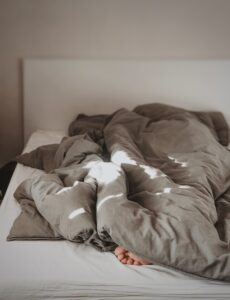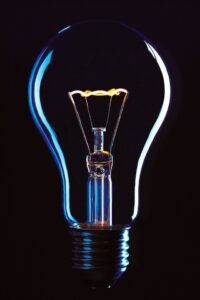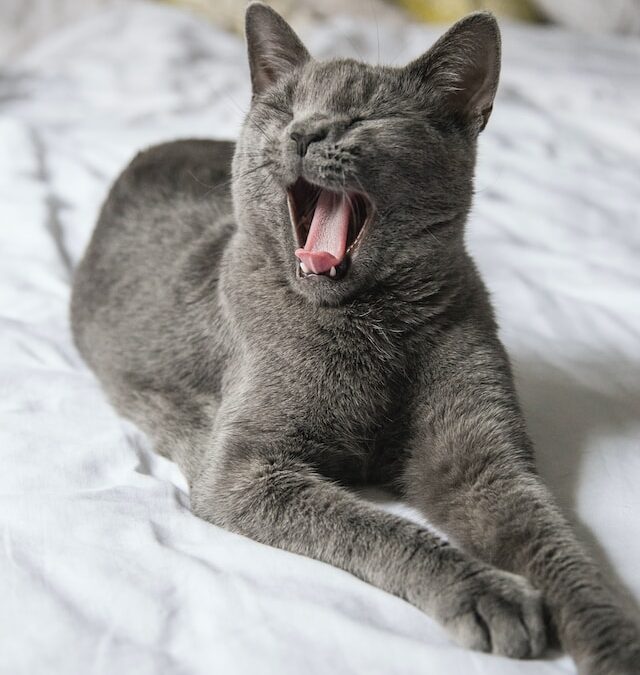“…To sleep – to sleep, perchance to dream – ay, there’s the rub,” according to Shakespeare’s Hamlet. But for ADDers, dreaming isn’t the issue, but getting to sleep at a descent hour can be a huge issue for many of us. I know staying up late was an issue for me for much of my life. However, a few years ago I began taking my bedtime – the time I actually go to bed – (and how I go about it) more seriously and was able to shift my old habits and now have a much healthier relationship with sleep. If you want the TL;DR version scroll down to the headline “So, we set out to Hack my Executive Function Issues….” And then come back up and read the rest to see why it worked.
descent hour can be a huge issue for many of us. I know staying up late was an issue for me for much of my life. However, a few years ago I began taking my bedtime – the time I actually go to bed – (and how I go about it) more seriously and was able to shift my old habits and now have a much healthier relationship with sleep. If you want the TL;DR version scroll down to the headline “So, we set out to Hack my Executive Function Issues….” And then come back up and read the rest to see why it worked.
The background: I had been reading up on the importance of sleep to our daytime executive functions. How it effects things like:
- Our memory
- Distractibility
- Our ability to start and stop tasks
- Regulating our emotions
- And even our ability to self-monitor or notice when things are going well or are going off the rails
And how difficult getting to sleep can be for many people with ADHD, including myself. The theory is that:
- The more hours of sleep we get
- The better sleep we get
- And the more consistent sleep and wake routines we have…
This equals an equation for stronger daytime executive functioning. Another day, I was listening to an interview on ADHD and executive functioning in general, when my brain put two and two together and lit up with an idea. The next time I spoke with my ADHD coach I brought up my light bulb moment:
“Everything about going to bed at a descent hour is an executive functioning decision, right when that part of our brain is at its weakest.”
We started brainstorming about my pretty much non-existent bedtime routine. My coach asked me to describe what goes on when I try to go to bed. What are the obstacles? I thought well everything is! Each of those items on my list had to do with executive functioning and making good decisions…when I am tired.
- Deciding or choosing to stop the pleasurable thing I am doing – watching TV, watching YouTube, reading a physical book, researching something on the computer, playing a video game, checking Pinterest or Facebook on my phone.
- Deciding to turn off the TV, or computer, or to put down the book
- Noticing that I’m yawning, and am actually tired, but continuing to watch or read more, then feeling wide awake later
- Standing up and turning off the computer or TV
- Walking into the other room and brushing my teeth and washing my hands and face
- Changing into my PJs
- Doing the Kitty chores (make sure they have water, and checking that the kitty litter boxes are clean and have fresh litter)
Each of those items is a potential obstacle to my getting to bed at a reasonable hour, as they all hang on executive functioning decisions or choices, when my brain is
- A) Happily enjoying the task I am doing and
- B) When my brain is tired and low on dopamine, a brain chemical that ADHD brains have issues with, which helps with executive functioning, and
- C) Also often involve screens and blue light, which can delay the onset of melatonin, another bit of internal chemistry that helps regulate our sleep.
 So, we set out to Hack my Executive Function Issues so I could Get to Sleep at a Descent Hour
So, we set out to Hack my Executive Function Issues so I could Get to Sleep at a Descent Hour
I started by realizing that getting off the computer was the first step in this new routine. And I remembered my tiny steps to beating resistance from Barbara Sher, that I referenced in an earlier blog post on ways to bust ADHD procrastination. Start small – So I started with a verbal reminder, at 9:30 pm, by my Alexa smart speaker. Originally, she said, “Go the h*ll to bed,” but then I was talking on the phone with a friend, she laughed, so I changed it to “Wind things down” – which, by the way she thinks rhymes with sinned, not mind. Then she plays mediation music. That combo was a good initial external signal to get me to shut down the computer at 9:30 pm. I find the verbal spoken reminders of google and amazon smart speakers to be more effective than a phone timer that I routinely ignore. Previously I had often still been at the computer ‘til after midnight. I also started wearing blue light blocking glasses after 7:30 at night, and set my phone to automatically go to bedtime mode (which means no color, just grey and black and white on the screen); my computer screen as well.
That got me away from that screen, but 9:30 was too early for me to go to bed; at the time I was routinely going to bed at 1, 2 or 3 AM. I wanted to push it back to midnight, (my eventual and current goal is 11 pm). So, I would shut down the computer most days at 9:30 and then I would shift to the comfy chair and read or watch TV. But I love reading and with TV, binge watching show after show was almost as bad as the computer use. I had substituted one executive function, hyper-focusing situation/disaster, for another. I needed a more radical solution.
My Anti-Light Bulb Nuclear Solution to Getting Myself to Bed
 In that earlier blog post on procrastination, I had tweaked an Isaac Newton quote to fit my needs, but I left off a part of the quote that came to be very useful to me. Newton’s 1st Law of Motion says that “A body at rest will remain at rest unless an outside force acts on it….” It is the “… outside force acts on it” part that started my brain ticking. My own executive functioning is weak at that time of night. And TV shows are excellent at capturing my attention and holding on to it very well; so are books. I tried turning off “show next episode,” it wasn’t enough. I needed something more external than my smart speaker.
In that earlier blog post on procrastination, I had tweaked an Isaac Newton quote to fit my needs, but I left off a part of the quote that came to be very useful to me. Newton’s 1st Law of Motion says that “A body at rest will remain at rest unless an outside force acts on it….” It is the “… outside force acts on it” part that started my brain ticking. My own executive functioning is weak at that time of night. And TV shows are excellent at capturing my attention and holding on to it very well; so are books. I tried turning off “show next episode,” it wasn’t enough. I needed something more external than my smart speaker.
Then I mentioned to my coach that years ago, I think we’d had our TV on a timer to simulate someone being home during the day, but that the timer was too complex. He said newer timers are digital, easy to set. So, I bought two timers for around $10 each, and put one on my TV and one on my living room lights. So, at 10 pm both my TV and my lights went off. THAT got my butt out of the chair and it was enough of an external thing, that I got up and head in to brush my teeth. Even the first night! One secret is that both plug/timers locations happen to be difficult to access, so I don’t stand up and change the timers on them. That’s why I don’t use the smart lightbulbs or plugs to turn out the lights with my smart speaker, because all I’d have to do it say, “Wake word, turn on the living room lights.”
After a few months I removed the timers and now do a pretty good job of getting to bed by 11 pm most nights. Occasionally, I switch up my routine to keep it fresh, and have added another couple of tips to my sleep routine. But that is fodder for another post.

